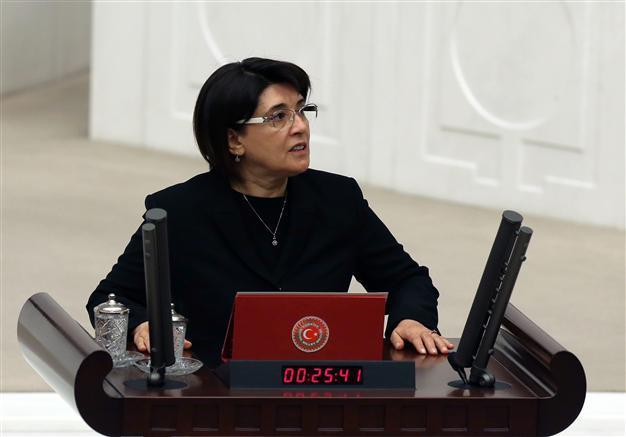Zana reportedly determined not to repeat oath before parliament
ANKARA

Leyla Zana, a prominent lawmaker of the Peoples' Democratic Party, expresses her wish for "peace" before taking her oath at the Parliament that kicks off a new term following the Nov. 1 elections, in Ankara, Turkey, Tuesday, Nov. 17, 2015. AP Photo
A leading Kurdish politician will reportedly not repeat an oath she is constitutionally required to take when taking parliamentary office even though the legislature’s speaker declared her reworded version to be invalid on Nov. 17.
“While this many young people have been dying, I couldn’t have remained silent,” Leyla Zana, an Ağrı deputy for the Peoples’ Democratic Party (HDP), was quoted as saying by CNN Türk late on Nov. 17.
Earlier in the day, at the first session of the newly elected parliament at the oath-taking ceremony, Zana, a Nobel Peace Prize nominee who spent a decade in prison for links to the outlawed Kurdistan Workers Party (PKK) after speaking Kurdish in parliament in 1991, used the phrase “the great nation of Turkey” instead of “the great Turkish nation,” prompting the acting speaker, Deniz Baykal, an Antalya deputy for the Republican People’s Party (CHP), to demand she recite the oath once more. However, Zana had already left the assembly hall.
“Some things need to change; I venture everything,” Zana was quoted as saying by CNN Türk. “Besides, I had used the phrase ‘the nation of Turkey’ instead of ‘the Turkish nation’ during a previous oath-taking ceremony as well,” she said.
Since there are no clear provisions concerning a similar incident either in the Constitution or in the internal regulations of parliament, the customary rules of the national assembly are set to be applied in the case.
During the next session that Zana attends, the speaker will invite her to the rostrum to take her oath before the assembly, T24 news portal reported. If she chooses not to do so, Zana will be disqualified from participating in legislative activities of parliament whether at the commission level or in plenary sessions in line with relevant provisions of both the Constitution and parliament’s internal regulation, T24 also said.
There are also suggestions that her salary will not be paid in such a case, the report said.
At the ceremony, Zana began her oath by saying, “With the hope of an honorable and lasting peace” in Kurdish.
A representative from her office told Reuters that the gesture was to raise awareness of the renewed conflict that has killed hundreds of people in Turkey’s mainly Kurdish southeast since July.
Speaking to reporters on Nov. 18, HDP co-chair Figen Yüksekdağ gave full backing to Zana. The turning of Zana’s oath into a crisis in today’s Turkey was very saddening, Yüksekdağ said, arguing the declaration of the oath as invalid for technical reasons was “the actual crisis.”
The technical reasons cited for declaring Zana’s oath invalid were actually “not valid,” she said.
While discussions over making a new constitution were on the agenda, creating a crisis over the current oath text was meant to be “closed to transformation,” Yüksekdağ added.
“What Leyla Zana did was not at all a stance that disrupted discipline and the functioning criteria of the parliament and was not aimed at troublemaking. She greeted the people who elected her in their language,” she also said.
Zana became a symbol of free speech across the world after serving 10 years in prison for speaking Kurdish while taking her parliamentary oath in 1991. She was ultimately released in 2004 and once again became an MP after the June 2011 elections, although a ban remained in place preventing her from joining the country’s then-main Kurdish party, the Peace and Democracy Party (BDP).
